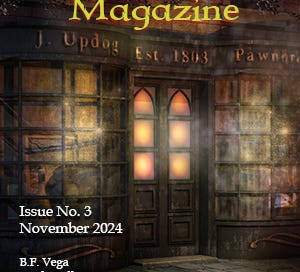“Pater. Ogle’s here.”
“Then send him in, Cranston.”
Philpott’s son fully opened the door, the letters “T. Phineas Philpott, Publisher” prominent in black and gold on the glass pane. Philpott sat behind his teak desk, piled high with galley proofs. A man bustled in wearing a black broadcloth suit with a loud bed of flowers vest and a high-crowned brown derby. He had lively, piercing blue eyes, but the left was strabismic, pointed outward as if always on guard for some potential threat.
“Good day, bon jour, buenos dias, Mr. Philpott. How very good to see you again, sir.”
“Indeed,” Philpott sniffed. “Please be seated, Mr. Ogle.”
Ogle sat opposite Philpott but didn’t bother to remove his hat or white doeskin gloves despite the summer heat. “You don’t call upon me unless you have really important work that needs doing. My expert services are at your disposal as always.”
Philpott looked intently at Ogle through his pince-nez. “I do have a commission, Ogle. There’s a Latin manuscript I want translated.”
“Oh, I can assure you of my bona fides on that account, Mr. Philpott. I’m an expert Latiner. De gustibus, non est disputandum and o tempora, o mores.”
“Quite.”
Philpott opened a drawer, pulled out a cracked, leather-bound manuscript and set it on the desk. Ogle flipped open the book. Faded yellow pages were crammed with narrow columns of dense Latin text.
“A scholarly work of some sort, I see.”
“Supposedly, it’s the Codex Secretorum Paracelsi, the Book of Paracelsus’s Secrets, written by a sixteenth century Swiss mystic, but it’s undoubtedly a later forgery, the sort of mumbo-jumbo publishers used to churn out in Paris before the Revolution. There’s still a market for it.”
Ogle’s gotch eye lit up at the prospect of profit. “To do justice to such a difficult work would require much time and effort on my part. I’m carrying out several translations already for some of New York’s most well-reputed publishers and newspapers. I couldn’t do the job for anything--”
“Just name your price.”




